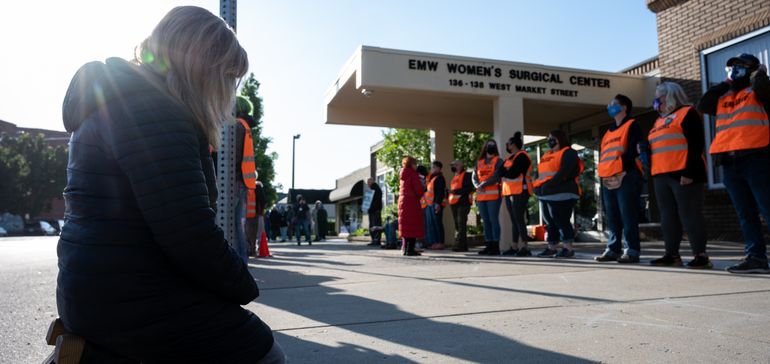
‘Chaos’ from state abortion bans going into effect will have legal, criminal implications for providers
The U.S. Supreme Court’s decision to effectively overturn the constitutional right to an abortion granted in Roe v. Wade presents a thicket of legal concerns and “chaos” for providers across the country, experts say.
With this opinion, 26 states are certain or likely to ban abortion, according to the Guttmacher Institute. There are also so-called zombie laws that have been on the books since before Roe but have been unenforceable since the landmark abortion rights case was decided nearly five decades ago.
Still, the fallout from Friday’s opinion will be felt by providers, medical groups and hospitals across the country, according to Isabelle Bibet–Kalinyak, who practices healthcare law at Brach Eichler.
“People are not prepared for the level of chaos this can create,” Bibet-Kalinyak said.
That ranges from primary care doctors doing screenings and prescribing medicine to specialists who provide fertility and abortion care to emergency room physicians, she added.
A major policy change in healthcare can take years of rulemaking to create coherent guidance for stakeholders to follow. The immediate upheaval the decision will cause will create a difficult ethical and legal environment for all physicians, especially OB-GYNs, researchers say.
An article published this week in the New England Journal of Medicine interviewed 25 Texas physicians following the state’s law banning abortion as soon as an embryonic heartbeat can be detected, typically about six weeks into a pregnancy when many people do not yet know they are pregnant.
Researchers found that physicians reacted differently to the law with some continuing to offer abortion counseling counseling and referrals, while others felt they could not do so.
“As Texas has shown, allowing politicians and fear to determine what care can be provided is dangerous for patients and clinicians alike,” the researchers wrote.
Individual states will have different levels of restrictions and different interpretations of abortion laws. This will be sorted out in the coming months and years in the courts and through additional lawmaking.
Bibet-Kalinyak said it’s unclear how abortion bans and restrictions would be enforced.
Providers are bound by federal and state laws as well as state medical boards. It’s already a patchwork of guidance and regulations and the sudden change from overturning Roe will only create more confusion and anxiety, she said.
State medical boards in states with restrictive laws could revoke or suspend licenses of providers they see as acting against the regulations, said Stacey Callaghan, who counsels healthcare entities for McDermott Will & Emery.
“There are a number of different types of risks that are housed in these various laws,” she said. “There are civil risks, there are criminal risks.”
The anti-abortion laws that will go into effect now have not been tested by the courts, and the landscape will be evolving as additional legislation and court cases are developed, said David Gacioch, also with McDermott Will & Emery.
“There’s going to be quite a range. It’s gonna vary wildly by state in terms of both timing and nature and severity,” Gacioch added. Prosecutors in some states are expected to push the boundaries of what is allowed under law. That could include pursuing felony convictions that come with lengthy jail time, he added.
“This is going to be a messy process,” he said.
Circumstances could be different even within states as county level officials also are likely to seek prosecutions, Gacioch said.
After the leaked draft showed that the court had struck an initial vote to end federal abortion rights, many medical groups spoke out against the draft opinion.
The American Medical Association adopted a stance against restrictions on safe reproductive medical care at its annual meeting earlier this month. It seeks legal protections for providers facing criminalization for reproductive health services as well as for patients who cross state lines to receive those services.
“Today, we fight in legislatures and in court to keep politicians from inserting themselves into our exam rooms, and dangerously criminalizing evidence-based care, including contraception, abortion and gender-affirming care,” new AMA President Jack Resnick said during his inauguration speech.